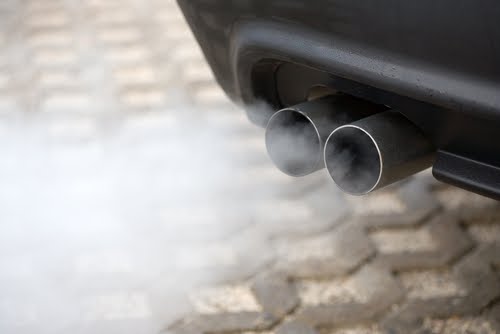
Call Us Now
303-573-1335

We’ve all had the misfortune of being stuck behind a car belching thick smoke and had the urge to report such a nuisance. But what about when your car is the one sending up smoke signals? Aside from annoying other drivers – not to mention the atmosphere – a car coughing out smoke can indicate a serious problem that requires immediate attention…or a not so serious problem. As you probably guessed, the issue comes down to a matter of color. Read on for a quick primer on exhaust smoke.
- Black Smoke: You might be surprised to learn that of the common colors seen with problem exhaust, black smoke is the least worrisome. Dark smoke typically means that more than the needed amount of fuel has entered the cylinder and the engine cannot burn all of this fuel. This condition is typically referred to as an engine that is ‘running rich’. Of course, there are several possible causes for excess fuel being present. These include:
Leaky fuel injector.
Carburetor that is out of adjustment.
Faulty fuel pump.
Problem with engine computer (or computer sensor).
**Be sure to check the engine oil if you are seeing black exhaust, since it is possible that the excess fuel can contaminate the oil system. If you notice a heavy/raw fuel smell when checking the oil, do not start the engine. Rather, contact a repair shop and explain your findings.
While the causes of black smoke are typically less serious than for other types of smoke, secondary issues often related to black smoke are decreased fuel economy, since unburned fuel is wasted fuel; reduced engine performance; and a distinct fuel odor under the hood.
-
White Smoke: Make no mistake, this seductive pure looking smoke is not your friend! White smoke usually indicates a comingling of antifreeze and/or water with fuel and air in the cylinder. The cylinder is meant to burn fuel and air together (and exclusively), but when the cylinder attempts to burn antifreeze or water, steam is produced. The steam is then released as white smoke from the exhaust system.
How can unwanted antifreeze/water enter the cylinder? This condition is often due to a failed head gasket (seal), which can occur when the engine overheats.
What to do if you see white smoke:
-
Check the radiator and its overflow bottle to be sure that the proper amount of antifreeze/water is present.
-
Determine if the engine oil has been contaminated by antifreeze (look for a chocolate milkshake type appearance on the oil dipstick or on the underside of the engine oil cap). If you notice this appearance, do not start the engine, as this can cause serious engine damage. Rather, call a repair shop and explain what you have found.
-
Blue Smoke: While not getting as much time up on screen at the movies(!), blue smoke can nevertheless indicate a significant problem. The cause of blue smoke is engine oil entering the cylinder, rather than antifreeze/water as in the case of white smoke. Oil can enter the cylinder due to a leak in any of a number of gaskets, seals or O-rings in the engine. Unsurprisingly, blue smoke more often occurs in older/high mileage vehicles, which are more likely to have such leaks. If you spot blue smoke, it’s time to have your car checked. Additionally, the use of a thicker weight engine oil, or a special oil additive aimed at reducing leaks, can sometimes reduce the amount of oil that enters the cylinder. A possible side effect of high volume leaking of oil into the cylinder is a fouling of the cylinder’s spark plug. The result can be an engine misfire. This can necessitate cleaning or replacement of the spark plug. As you know, it’s simply proper driving etiquette not to blow a thick cloud of exhaust into your fellow driver’s path(!), But etiquette aside, what does visible smoke really tell you? As you may have guessed, it all comes down to color.
